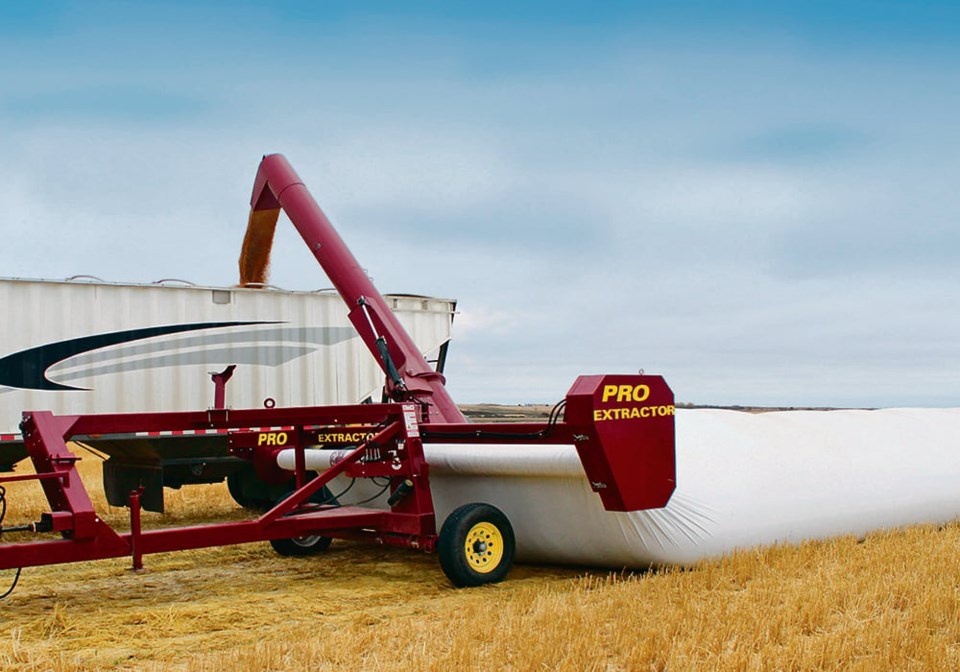WESTERN PRODUCER — Are grain bags getting bigger, smaller or just better? That question was proposed by Vern Kirk on a recent Flaman Connect podcast. Kirk manages Prograin equipment in Colonsay, Sask.
The April 24 Flaman Connect was hosted by Mitch Flaman, along with Flaman employees Trevor Grinde and Regan Kunz. The following is a partial transcript of their conversation.
KUNZ: So, have you seen a steady increase in the use of baggers over the course of time?
KIRK: Yeah, every year seems to be another reason to use them. There’s a lot more competitors now than when we first started building them in 1986. In Argentina right now, they bag over half their commodity, because it’s a fast way to handle a lot of bushels and it’s convenient. They do two crops per year.
KUNZ: Where do you feel the product line is going? What’s the next step? Is it bigger bags? Is it maybe smaller, more versatile bags?
KIRK: I think there’s two ways we can go. We can make it more luxurious, more complex. But in our mind, at the end of the day, you’re just putting grain in a bag. How much you want to spend can dictate how fancy the machine is. The technology is there to make it very easy. We tend to lean more to where there’s more real value. A grain bagger or extractor is not a machine that needs luxury. In fact, in some of our models, we’ve cut back on luxury. We’ve found more farmer interest in durability.
Combines grew up and they’re very big. Grain carts grew up and now they’re huge. And we’re next in line. The grain cart dumping into us has to be very dependable. Otherwise you’ve got multiple combines sitting still because of our failure. So that’s a lot of pressure on us.
It has to be simple. If it does break, it has to be very easy to fix. Factors like common bearings help a lot.
KUNZ: We had a representative from AGI on the podcast not too long ago. It’s the same deal with augers they’re selling. Augers are the last line of defence when it comes to efficiency on the farm. You can have all the combines and grain carts you want, but if you’ve got nowhere to go with the grain, you’re bottlenecked.
KIRK: Yeah, this guy came up to me at a farm show and says, “can you guarantee this bagger won’t break down?” I told him absolutely not. He said “well, I can’t have my combine stopped it the field.” I told him the other option was to buy a second bagger and just have it sitting nearby. He said that’s a good idea, so he’s thinking about it. That’s the best guarantee I could give him.
KUNZ: Absolutely. You cannot guarantee a product. It’s a man-made machine. We’ve said this on almost every episode: If God made it, it’ll die. If man made it, it’ll break.
GRINDE: When you’re working on developing product, what does your R and D process look like?
KIRK: We have a very small R and D program. Our ideas come from farm shows and talking to farmers. They tell us what works and what doesn’t and what changes they want. That’s where we get our ideas. Once we make a change, we need to test it because it’s way easier to sell it if you know it works. Customers want value. They want it dependable. People will pay more for dependability than for luxury. If it doesn’t work, they don’t’ care how much money they saved on it, because it let them down. So it has to work.
KUNZ: Yes, it has to work. If we want to keep the ag industry growing and healthy, we need to rely on urban kids to see agriculture as a legitimate employment opportunity. Not just rural kids, because we’re running out of rural kids.

